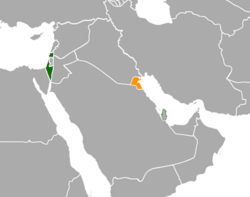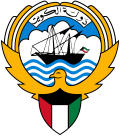History
Kuwait boycotts and bans Israeli products and its media and government refers to Israel as the 'Zionist entity'. [4]
Following the Iraqi invasion of Kuwait and the start of the Gulf War, during which Iraq launched missiles against Israel, America insisted on Israel not to join the war in fears that it would lead to Arab states abandoning the coalition created in order to fight Iraq. [5] [6]
In January 2014, Kuwait boycotted a renewable energy conference in Abu Dhabi as it was attended by Israel. [7]
In October 2017, Kuwaiti Speaker of the National Assembly Al-Ghanim, at a Inter-Parliamentary Union meeting in Russia, labeled the Israeli delegation as "state terrorism" and urged them to pack their bags and get out. The Israeli delegates left amid applause from other attendees. [8] He was welcomed back in Kuwait with praises by the Emir as well as people of Kuwait. [9]
On the heels of the Abraham Accords, in response to Trump announcing that Kuwait could be the next Arab country to recognize Israel, Kuwait denied the claims and said,"Kuwait will be the last country to recognise Israel". [10] [11] The Late Emir of Kuwait, Sheikh Sabah Al-Ahmad Al-Jaber Al-Sabah refused, on the last days of his life, to attend the normalizing Bahrain Economic Conference, which was held in Manama in 2020. Marzouq Al-Ghanim reported in an interview that the Emir of Kuwait called him in anger at that time and told him: "Look my son, I am old now and I don't want to meet my Lord having shaken hands with Zionists." The Emir then asked Al-Ghanim to work on Kuwait's non-participation in the conference. [12]
This page is based on this
Wikipedia article Text is available under the
CC BY-SA 4.0 license; additional terms may apply.
Images, videos and audio are available under their respective licenses.

